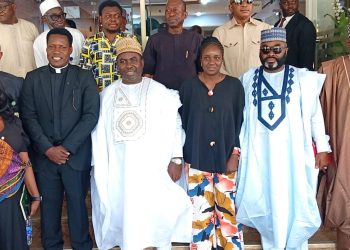By: Mnena Iyorkegh, Abuja
The United Nations Educational, Scientific and Cultural Organization UNESCO has launched The Readiness Assessment Methodology (RAM) in Nigeria to ensure Artificial Intelligence (AI) is developed and deployed in ways that upholds human rights, fairness, transparency, and accountability.
RAM serves as a vital instrument for assessing a country’s readiness to implement AI ethically and responsibly.
It also highlights strengths and identifies infrastructural, institutional, and regulatory gaps, enabling nations to address these challenges effectively and create an ethical AI ecosystem.
Speaking at the launch in Abuja, Nigeria’s capital, the The Head of Office UNESCO Nigeria, Abdourahamane Diallo, said that the launch signifies a pivotal moment in Nigeria’s journey towards embracing ethical artificial intelligence practices.

As we gather here, we are reminded of the transformative potential of AI in driving innovation and sustainable development across our nation. UNESCO’s Readiness Assessment Methodology (RAM) stands as a beacon of guidance, ensuring that our advancements in AI are not only groundbreaking but also aligned with global standards of ethics and responsibility. We are particularly proud that Nigeria is joining us as part of UNESCO’s custodial role in promoting the ethics of AI worldwide.
According to him, Nigeria is poised to become a leader in ethical AI implementation, setting a benchmark for other nations to follow
“UNESCO’s Recommendations on the Ethics of AI, adopted by 193 countries, provide a robust framework for the responsible and ethical development and deployment of AI technologies. These recommendations emphasize human rights, fairness, transparency, and accountability, and it is heartening to see Nigeria committing to these principles as we work together to build an inclusive and ethical AI ecosystem. We are reminded of the profound impact that artificial intelligence has on our society.

AI permeates many aspects of our daily lives, and its ethical implications have become a focal point for all actors within the ecosystem. ”
Similarly, Nigeria’s Minister of Communication, Innovation and Digital Economy: Dr. Bosun Tijani reiterated Nigeria’s readiness in tapping into the benefits of AI.
“Nigeria is one of the most active country when it comes to investments in infrastructure and the government of President Bola Ahmed Tinubu is already prioritize investments in our digital backbone which is why we’re investing in 90,000 kilometers of fibre AI cable across the country. The AI strategy that we did, which UNESCO supported, also highlighted some key things that we’re doing to drive artificial intelligence. One is the large language model, which actually has been developed by young Nigerians.
Dr. Tijani added that: “We’re also working with the Galaxy backbone to ensure that we can have our own compute in Nigeria, which means there’s a technological backbone beyond connectivity, but the processing power the compute power for young people who wants to build locally relevant, but also solutions that are of interest to the nation to have a complete power they need.
So I think where we are going is extremely exciting. The report from UNESCO, with ensuring that we build ethically, is only going to make us stronger. I’m very optimistic that in the next one to two years, Nigeria will be one of the top countries in the world when it comes to artificial intelligence ( AI).
He added, according to the Secretary-General, Nigeria National Commission For UNESCO, Mr. Olagunju, Idowu, calls for collective efforts towards a future where AI is harnessed for the greater good of all.
“As Nigeria embarks on its journey to implement Artificial Intelligence (AI) across various sectors, it is imperative to ensure that this transformative technology is adopted ethically and responsibly. By this initiative, Nigeria will be better positioned to harness the full potential of AI while safeguarding the interests of its citizens. This approach will not only drive technological advancement but also ensure that the benefits of AI are distributed equitably and responsibly.
















